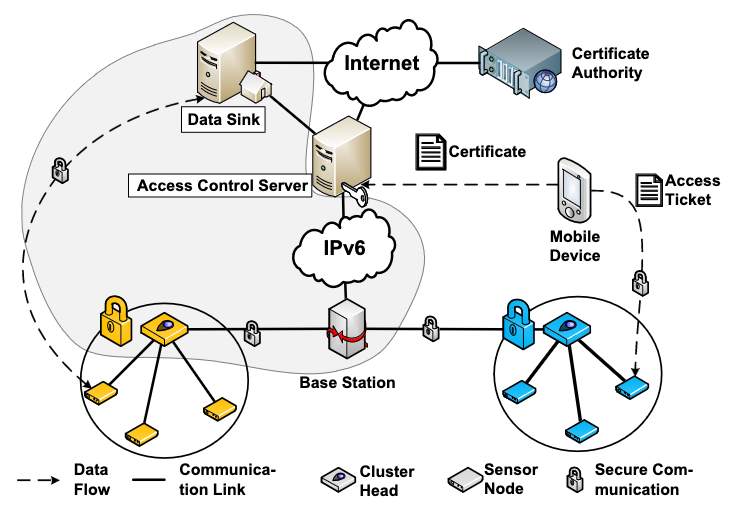Teaching Activities
@ Chair for Network Architectures and Services, Department of Computer Science, Technische Universität München, Germany

Besides lecturing I supervise students in their trainings and final theses. For details click here.
- 3 Master Theses
- 7 Bachelor Theses
- 2 Software Development Projects (ger. SEP)
- 1 Admission Thesis (ger. Zulassungsarbeit)
- Further ones as second advisor.
Courses Overview (e.g., lecturer substitute or organizer)
Lecture Introduction to Computer Networking and Distributed Systems
- B.Sc. and M.Sc.
- Summer terms: 2011, 2010, 2009, and 2008
- Lecture and excercise organizer
- Description: The course deals with basic topics from the areas of communication and computer networks and distributed applications. The material covers the fundamentals of digital information transmission, the structure of local and global networks (ISO/OSI model, protocols, network components) and an introduction to security aspects.
Practical Course iLab2
- B.Sc. and M.Sc.
- Summer term 2010
- Organizer
- Description: iLab 2 builds on iLab 1 and extends networking concepts.
Practical Course iLab1
- B.Sc. and M.Sc.
- Winter term 2008/2009
- Organizer
- Description: The theoretical contents of the networking lectures are explored in practical exercises. You will set up all these services (and more) by yourself and learn how they work in detail: Students will see how machines can be provisioned with network configuration (e.g. SLAAC). With dynamic routing protocols, such as OSPF, networks are made resilient against failures. DNS and DNSSEC are set up to provide name resolution from the root zone downwards. Students will look at security protocols and see how TLS can be used securely in the popular combination with HTTP. Using IPsec, students will learn to protect all IP traffic. To hide communication meta data, a protection not usually offered by security protocols, students create an onion routing network using Tor. Students break popular WLAN encryption and set up more secure protocols instead. For link layer authentication, students use 802.1X and RADIUS.
Advanced Seminar: Innovative Internet Technologies and Mobile Communication
- B.Sc. and M.Sc.
- Winter terms: 2012/2013, 2011/2012, 2010/2011, 2009/2010, and 2008/2009
- Summer terms: 2012, 2011, 2010, and 2009
- Organizer and supervisor of various topics
- Description: Seminar covers general and specific topics in the area of Internet technologies and mobile communication.
- Topics advised:
- Kryptographische Protokolle SSL/TLS und Web-Services
- Identity Federation und Web-Services
- IT-Sicherheit - Faktor Mensch und psychologische Aspekte
- Cross Layer Security Frameworks for Wireless Sensor Networks
- Kommunikationsstandards in Wireless Sensor Networks
Advanced Seminar: Future Internet
- B.Sc. and M.Sc.
- Winter terms: 2012/2013, 2011/2012, 2010/2011, and 2009/2010
- Summer terms: 2012, 2011, 2010, and 2009
- Block course
- Organizer and supervisor of various topics
- Description: Seminar covers topics around future Internet including, solutions, protocols, algorithms, and current research investigations.
- Topics advised:
- Integration von Sensornetzen ins Internet
- Standards zur Gerätevernetzung
- TLS Solutions for Wireless Sensor Networks
- Watermarking in Sensor Data Sets
Advanced Seminar: Sensorknoten - Betrieb, Netze und Anwendungen
- B.Sc. and M.Sc.
- Summer terms: 2012, 2011, 2010, 2009
- Block course
- Organizer and supervisor of various topics
- Description: Seminar covers topics around future Internet including, solutions, protocols, algorithms, and current research investigations.
- Topics advised:
- Überblick und Vergleich von Sensorknotentechnologien
- TinyOS: Ein Betriebssystem für Sensorknoten
- Einführung in das Structural Health Monitoring
- Einführung in das Thema Wireless Sensor Networks und Vergleich von Knotentechnologien
- Sensorknoten - Sicherheit auf Schicht 2
- Sensornetworks - Integration into IPv6 based networks and security on layer 3
- Sicherheit durch Hardwareeinbindung - secFleck
- Lightweight Key Management in Wireless Sensor Networks by Leveraging Initial Trust
- Mechanismen der zufallsbedingten Schlüsselvorverteilung in Sensornetzwerken
- Key management in wireless sensor networks focusing on predistribution by group deployment
- Energieverbrauch von Sensorkomponenten - Optimierung der Sensorknommunikation
- Einführung in Sensornetze - Abhängigkeiten zwischen Protokolldesign und verwendeter Hardware
- Event Detection in WSNs - Vehical Tracking
- TCP/IP Communication in a WSN
- "Random Key Distribution" Verfahren in WSNs - Vergleich verschiedener probabilistischer Ansätze
- Sicherheit in WSNs - Node Replication Angriffe
- Packet Reordering on Gateway as a Representative of Data Processing Techniques
- TLS solutions for WSNs, Wireless Body Area Networks (WBAN)
- Umweltmonitoring mit SensorScope
Special talk on how to write a thesis and how to give feedback
- B.Sc. and M.Sc.
- Winter term 2010/2011
- Summer terms: 2011, 2010, and 2009
- Description: The talk is includes in the seminars supporting students in writing theses and reports focusing on general structures and literature research/referencing. Furthermore, the talk gives hints how feedback works and how to improve own presentation skills.
Teaching Activities Before and After
- Research Institute CODE, Universität der Bundeswehr München, Neubiberg, Germany (since 2018)
- Department of Mathematics and Informatics, University of Basel, Switzerland (2015-2017)
- Communication Systems Group, Department of Informatics, University of Zurich, Switzerland (2013-2018)
- Chair for Technical Informatics, Eberhard-Karls University, Tübingen, Germany (2001-2005)
